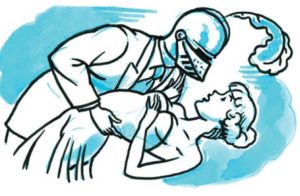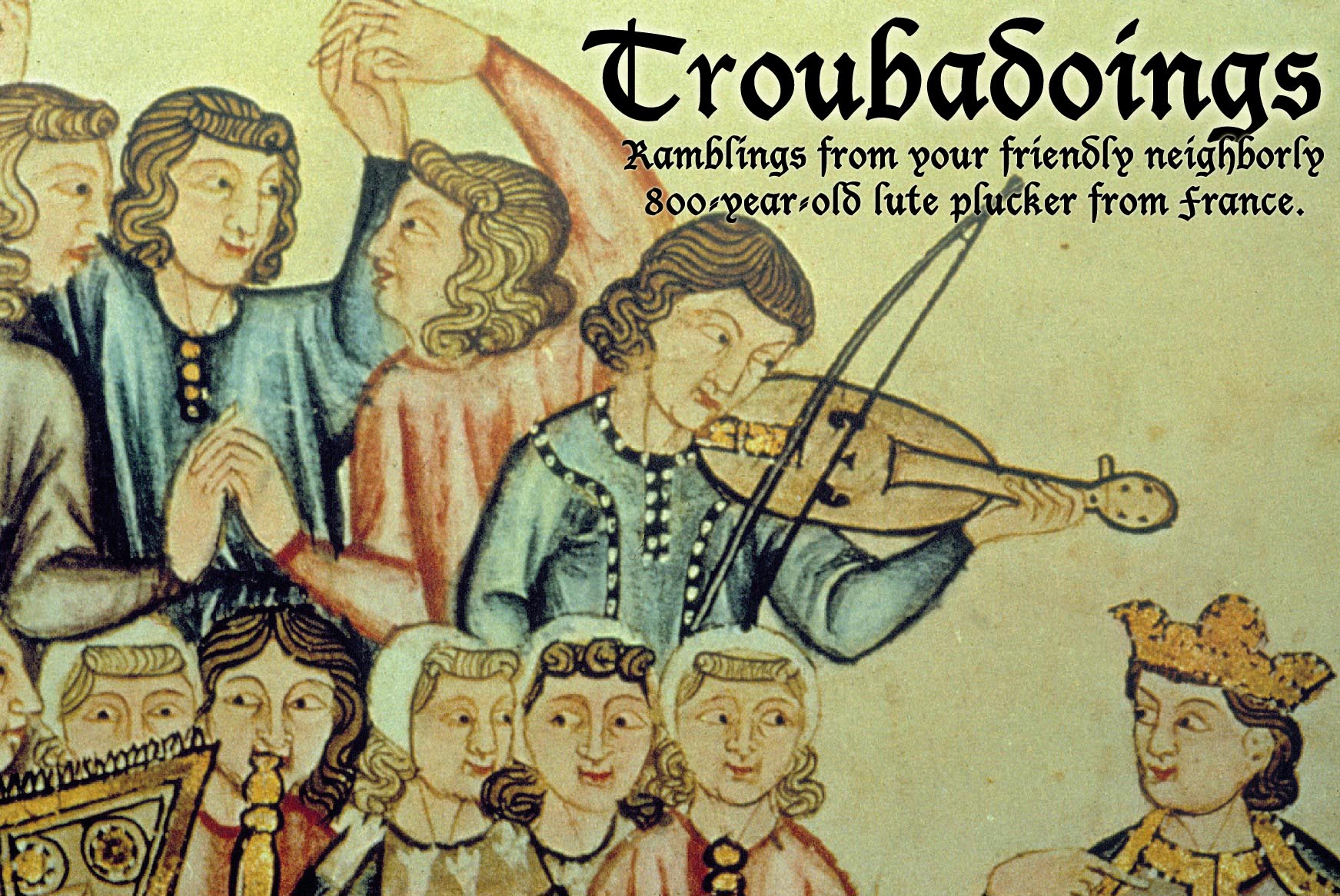
[So. Here I was all set to post up yet another abomination of rhetoric, language, and good taste, when WHAM: I spied an email in my Inbox from Tim Butterfield. And OMG! This has entirely forced me to change plans, scrap the rhetoric, and concoct new “language.” Right. And, yes, I do want to show y’all what he was talkin’ about–maybe I’ll append it to the bottom of this “thing”–but really and truly? Today’s revised topic was first suggested by our friend Chase Williams, who six days ago wrote: “So I think the real question is: What ever happened to Chivalry?” Indeed. So thanks be to Chase and Tim, and now without further ado…]
The Washington Administraction Presents…
WHAT EVER HAPPENED TO [“Chivalry”] ?
Really, ya know? Bein’ nice? Opening store doors and car doors for fair maidens in diss dress? Bowing at the–or in spite of–waste. I mean waist. Taking off your frickin’ polar-tech high-gloss thermal-lined running jacket and placing it ever so nonchalantly across the mud puddle before m’lady’s tootsies.
Indeed. And what ever happened to “m’lady”?
My lady is fine. Yours is questionable. It’s all about “me” anyway, not you. Please re-read last week’s epistle. Anyway, we’re yakkin’ up chivalry today, and no further sudden emails are gonna distract yours troubly from his topic.
So, what DID happen to chivalry anyway?
It isn’t commonly known in this day and age, of course, but centuries ago–before asphalt was invented, or even cobblestones–nearly every street of every city in the world was just, like, you know, MUD. During and after the rain especially. Sometimes even during and after the snow. And sometimes the entire civilized planet simply resembled your typical trail in the Kettle Moraine. (But not Massanutten! That’s only rocks. Rocks repel mud. Just like these spiffy running jackets do, which you are NOT taking off and putting down so the ladies can step on ’em.)
Where was I? Oh, centuries ago. Right. Centuries ago there actually were inventions that the ladies could slip under their shoes which would in fact help keep them out of the mud. They were called “pattens.” [http://en.wikipedia.org/wiki/Patten_(shoe)] I kid you not.
But it was kinda like walking on stilts. Milady oft fell off her perch, twisted her well-turned ankle, and spilled directly into the waiting outstretched arms of her squire, footman, or troubadour. I kid you not. [See below.]
But this, too, is an “I digress”shun. We’ll return to our regularly scheduled topic immediately… right after an uninvented commercial for “troubadours” and why you should hire them to sing for you and, while they’re at it, compose brand-new medieval poetry.” Look among those particularly who already are in the Middle Ages.
For today only an ancient off-tunesmith and literary hack could possibly still be wearing a “cloak”–fer heaving’s sake!–of the kind that could easily be removed and splayed across a puddle. Every other male is wearing Gore-tex. [Yes, its registered trademark is duly noted, but ask Steve Jobs where the hell he put that type of symbol inside his iMac “Mail” program, huh?]
So, WHAT the heck EVER else happened to CHIVALRY???
Did the gals all refuse it? Did your typical “lady-in-waiting” get damn tired of having to STOP all the time and WAIT for some gallant clumsy frumpy knave to strip off half his “body armor” and splash the wrinkled threads down in front of her? Were these distressed damsels THAT anxious to continue on their way? Did they wish not to be hampered, or slowed, or unduly encumbered by ANY pompous frilly overdressed pretty boys who were ten times less physically fit than they were? Did they wanna “chick” dudes even then??
“Yes, ma’am.” “Thank you, ma’am.” “Would you like me to dry you off with this towel, ma’am, or do you prefer the au naturale air drying?” Whatever happened to today’s men saying THOSE things? Eh?
I’ll tell you what happened to chivalry. Chevrolet stole the concept. [Yes again, the “R with the circle around it” is duly accredited.] Chevy built the Corvette Stingray, and women (and men) have been ruined ever since. Men simply can’t catch up with women long enough to hold ANY doors open or protect their pair of Air Nike Pegasus [Yup, trademarked] from street water, creek crossings, or rainy trails’ going to hell. Women have simply learned how to do *without*.
Chivalry is dead because all the damn male fat asses proved to be too freaking SLOW!!
And women have wisely chosen to keep their youth and vigor from now on, too. And, oh yes, lose weight. I believe that in today’s day and age, most gals will agree that they look their very spiffy underdressed best *after* they’ve shed between 180 and 310 pounds of unwanted weight…
…at the courthouse.
( O_O )
Yours troubly,
The Troubadour
“your Middle Age song-and-dance-‘meister’ ever since that first stringy dweeb decided to pluck his lute”
Yankee Folly of the Day:
ALL of the following, courtesy of Tim Butterfield:
Congrats! You’re the M-W Word of the Day.
****************************************************************
Play Merriam-Webster’s free word games — Word Sudoku, Deep Sea Word
Search and more.
http://www.merriam-webster.com/game/index.htm?&t=1294087108
****************************************************************
The Word of the Day for May 25 is:
troubadour \TROO-buh-dor\ noun
1 : a lyric poet or musician who performed chiefly in southern France
and northern Italy in the 11th through 13th centuries
2 : a singer especially of folk songs
Examples:
The small coffeehouse includes a performance space where troubadours
from all over can come to play music for the other patrons.
“A tango diva and modern troubadour, [Maria] Volonté is an ardent
singer-songwriter who lives true to her spirit, a spirit that has sent
her on a lifelong expedition across countries and cultures through
myriad musical styles.” — From a review by Milton D. Carrero in The
Morning Call (Allentown, Pennsylvania), April 20, 2012
Did you know?
In the Middle Ages, troubadours were the shining knights of poetry (in
fact, some were ranked as high as knights in the feudal class
structure). Troubadours made chivalry a high art, writing poems and
singing about chivalrous love, creating the mystique of refined
damsels, and glorifying the gallant knight on his charger.
“Troubadour” was a fitting name for such creative artists; it derives
from an Old Occitan word meaning “to compose.” In modern contexts,
“troubadour” still refers to the song-meisters of the Middle Ages, but
it has been extended to cover contemporary poet-musicians as well.
Test Your Memory: What word completes this sentence from a recent Word
of the Day piece: “Aunt Mabel claimed she had the magic touch to
__________ a cranky baby, and indeed, as soon as she picked up her
infant nephew he settled right down”? The answer is …
http://s.m-w.com/IXccpz
[Yo. I haven’t looked, but my guess for filling-in-that-blank is: “pacify.” How’d I do?]
 Rich Limacher © 2021 | All Rights Reserved
Rich Limacher © 2021 | All Rights Reserved
Leave a Reply